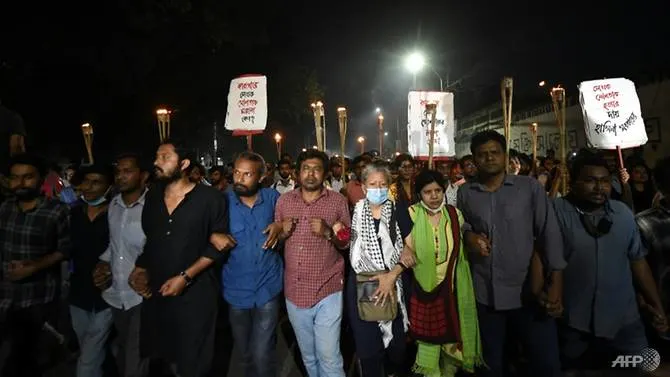Clashes in Bangladesh capital after article writer dies in jail
27 February, 2021

Students clashed with police found in Bangladesh's capital on Friday (Feb 26) while anger mounted in the death of a writer and government critic found in a high-security jail.
At least 18 police and an unknown number of protesters were injured in the clashes, authorities and witnesses said, amid worldwide demands for an independent investigation in to the death of Mushtaq Ahmed.
An AFP correspondent saw police using batons and firing tear gas at students who staged a torchlight march calling for "justice" close to Dhaka University.
Police said in least six students who allegedly attacked security forces with torches were detained. Extra protests were planned for Saturday.
Ahmed was arrested in May beneath the tough Digital Security Action - that opponents say undermines freedom of speech - after he criticised the government's handling of the coronavirus pandemic.
The 53-year-old, a crocodile farmer in addition to a writer known for his satirical style, was charged with spreading rumours and conducting "anti-state activities" on Facebook.
Jail authorities said Ahmed fell unconscious and died about Thursday in the Kashimpur high-security prison beyond Dhaka.
He previously not been suffering from a significant illness, according to prison chief Mohammad Ghiasuddin.
TOUGH SECURITY LAW
Cartoonist Ahmed Kabir Kishore was detained as well and remains in custody. Both men possessed several bail requests turned down, the latest this week, and their treatment has faced mounting criticism.
Ahmed's lawyer demanded an unbiased inquiry in to the death.
Thirteen ambassadors from countries including the USA, France, Britain, Canada and Germany also expressed "grave concern".
"We call on the federal government of Bangladesh to conduct a swift, transparent, and independent inquiry into the total circumstances of Mr. Mushtaq Ahmed's loss of life," the ambassadors stated in a statement.
They said there will be follow up approaches over "wider concerns about the provisions and implementation of the DSA, together with questions about its compatibility with Bangladesh's obligations under international human rights laws and standards."
Rights organizations have raised suspicions about the death.
The New York-based Committee to safeguard Journalists also known as for "a swift, transparent, and independent insvestigation", while PEN America said that Bangladesh authorities also needs to drop charges against Kishore.
"Not merely should Ahmed haven't been detained designed for his independent expression and critical views to begin with, his unjust death beneath the authorities' watch right away adopted his complaints of torture as a result of the security forces," stated PEN America's free expression experienced Karin Deutsch Karlekar.
Ahmed's prosecution beneath the Digital Security Action was an example of the "worst type of form of repression", explained Saad Hammadi of Amnesty International.
"No one must have to die solely for exercising their right to freedom of expression," he added.
Brad Adams, Asia director for People Rights Watch, echoed that, saying: "Ahmed's death has dispatched a chill through Bangladesh civil society and should force the federal government into ending this peremptory treatment of tranquil criticism."
Around 2,000 situations have been filed beneath the law because it was enacted in 2018, according to Amnesty.
Many leading editors and senior journalists have already been targeted for prosecution under the law.
Source:
TAG(s):
